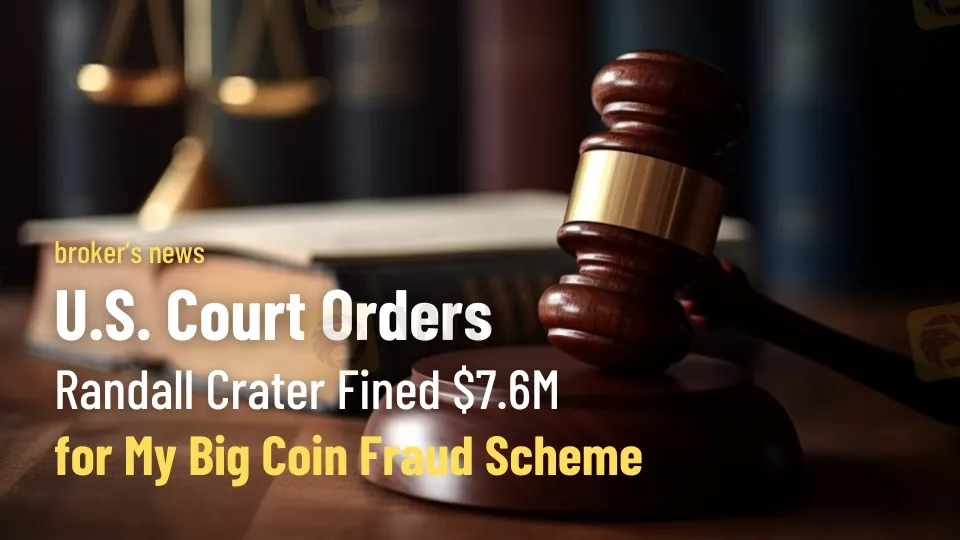U.S. Court Orders Randall Crater Fined $7.6M for My Big Coin Fraud Scheme
Abstract:Randall Crater was fined $7.6M for My Big Coin fraud, banned from trading, and sentenced to prison in a landmark CFTC enforcement action.

The United States Commodity Futures Trading Commission (CFTC) has obtained a consent order against Randall Crater of Heathrow, Florida, for his role in a fraudulent digital asset scam. The United States District Court for the District of Massachusetts ordered Crater to pay over $7.6 million in reparations to people cheated by his My Big Coin (MBC) scam.
The settlement decree, which addresses the CFTC's allegations against Crater, also includes a permanent injunction prohibiting him from trading in CFTC-regulated markets, transacting with digital asset commodities, or registering with the CFTC. This ruling followed a concurrent criminal case in which Crater was sentenced to more than eight years in jail and had to pay $7.6 million in restitution and forfeiture.
From January 2014 to January 2018, Crater and his co-defendants ran a fraudulent enterprise that marketed My Big Coin as a fully working virtual currency backed by gold. Crater misled at least 28 consumers by making false statements regarding the value, trading status, and usability of MBC, stealing more than $7.6 million. He used the money to buy luxury things including a house, antiques, fine art, and jewelry.
The CFTC's action against Crater's co-defendants—Mark Gillespie, My Big Coin Pay, Inc., My Big Coin, Inc., John Roche, and Michael Kruger—is still pending. The CFTC has warned that, while restitution orders are intended to recoup lost monies, plaintiffs may not always get full compensation due to insufficient assets retained by wrongdoers.
This lawsuit demonstrates the CFTC's commitment to combatting digital asset theft and protecting consumers. Crater's conviction and punishment in the related criminal case emphasize the gravity of his acts. On July 21, 2022, he was convicted of wire fraud, illegal monetary transactions, and running an unregistered money-transmitting company.
The CFTC continues to prioritize prosecuting fraudsters responsible and ensuring the integrity of digital asset markets. Victims of such scams are advised to report suspicious activity to the CFTC to help with continuing enforcement operations.
This example serves as a clear reminder of the hazards connected with digital asset investments, as well as the significance of doing due diligence. As the CFTC steps up its assault on fraudulent schemes, it hopes to create a safer and more transparent market for all participants.

Read more

FCA Flags 10 Unauthorised Firms and Clone Entities in Latest Scam Alert
The FCA has recently flagged multiple entities for offering financial services without authorisation, warning the public to remain vigilant against clone firms and unlicensed platforms that may mislead UK consumers.

ASIC Launches Streamlined Digital Platform for AFS Licensing
ASIC launches a new digital AFS licensing platform on May 5, 2025, streamlining applications with a user-friendly interface and enhanced features.

Global Traders Sound Alarm Over Dollars Markets' Shady Practices
This article exposes the alarming experiences of global traders with Dollars Markets, a low-rated and blacklisted broker, highlighting serious issues such as withdrawal delays, suspicious payment methods, and possible links to illegal online gambling.

Exposing the Dark Art of Pig Butchering Scams
A new type of scam is spreading fast through the world of online trading and cryptocurrency. It’s called the "pig butchering" scam. The term “pig butchering” comes from a Chinese phrase, “Sha Zhu Pan”, which describes the way a scammer treats their victim like a pig by slowly “fattening” them up with kindness and attention before “butchering” them for money.
WikiFX Broker
Latest News
Unlocking Forex Profits: Your Guide to Smart Currency Trading
FBI Calls on AML Bitcoin Scam Victims to File Claims by June 5
Donald Trump prizes more Gulf investment in the US
Exposing the Dark Art of Pig Butchering Scams
ASIC Launches Streamlined Digital Platform for AFS Licensing
Global Traders Sound Alarm Over Dollars Markets' Shady Practices
CySEC Withdraws CIF License of Viverno Markets Ltd
CMC Markets Partners with FYNXT to Enhance Client and Partner Portals
CySEC Revokes License of Viverno Markets Following Extended Inactivity
CME Group Penalizes PIMCO for Exceeding Crude Oil Futures Position Limits
Rate Calc

